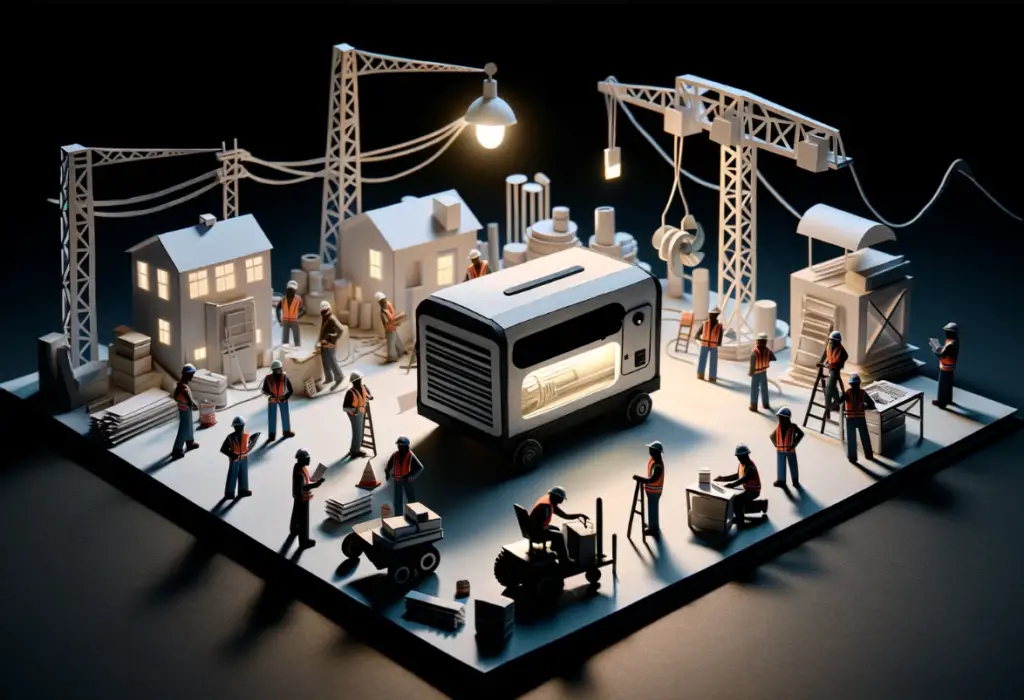The pros of Generac generators are their cost-effectiveness, as they are generally less expensive than other brands, especially for the smaller models, and an impressive average lifespan of 3,000 operating hours, which equates to over 30 years of usage, offering long-term reliability. The are good for both homeowners and businesses.
The cons of Generac generators are frequent maintenance, higher maintenance problem likelihood, high noise levels unsuitable for quiet areas, and a 2023 recall of over 60,000 portable generators for safety concerns. Installation costs range from $3,000 to $20,000, depending on size.
Takeaways:
- Generac generators are known for their reliability and performance, with a reputation built on consistent performance and resilience.
- The initial investment and installation costs for Generac whole home generators can be substantial, but the long-term value and uninterrupted power supply justify the expense.
- Generac generators offer fuel-efficient options such as natural gas, propane, and solar power, with considerations for fuel availability and operational costs.
- Routine maintenance is crucial for optimal performance and longevity, and Generac’s widespread service network enhances the serviceability of their generators.
Generac Generators Fact Sheet
Company Profile
- Headquarters: Waukesha, Wisconsin
- Founded: 1959
- Public Listing: NYSE in 2010
- Revenue: $2.023 billion
- Employees: ~9,160
Product Highlights
- Power Range: 800 watts to 9 MW
- Product Types: Gasoline, diesel, bi-fuel generators; transfer switches
- Innovations: Reintroduced portable generators in 2008; Fiat Powertrain partnership in 2009
Recognition & Awards
- Workplace: Best Places to Work by Milwaukee Magazine
- Products: Plant Engineering “Product of the Year” silver award; Good Housekeeping Seal
- Industry: Natural Gas Generator Company of the Year 2014
Sources:
https://www.sec.gov/edgar/browse/?CIK=1474735
https://finance.yahoo.com/quote/GNRC/profile?p=GNRC
Recall:
https://www.usatoday.com/story/money/2023/09/18/generac-portable-generator-recall/70889117007/

Pros and Cons of Generac Generators
| Pros of Generac Generators | Cons of Generac Generators |
|---|---|
| Competitive Pricing | Frequent Maintenance Requirements |
| Longevity and Durability | Noise Levels in Some Models |
| Automatic Operation | High Cost of Higher-End Models |
| Safety and Compliance | Weight and Space Requirements |
| Self-refueling System | Variability in Maintenance Costs |
| Remote Monitoring Capabilities | Dependence on Fuel Availability |
| Diverse Product Range | Complex Installation Process |
| High-Quality Products | 2023 Recall Due to Safety Concerns |
| Customer Satisfaction and Support | Potential Environmental Impact |
| Environmentally Friendly Options | Limited Availability in Certain Regions |
Pros of Generac Generators

- Competitive Pricing: Generac generators are priced competitively, offering an affordable solution compared to other brands in the market. This affordability does not come at the cost of quality, as Generac maintains high standards in manufacturing. Their pricing strategy makes backup power more accessible to a broader range of customers, from residential to industrial users.
- Longevity and Durability: On average, Generac generators have a lifespan of over 30 years, assuming proper maintenance and average operating hours. This longevity is a testament to the quality of materials and engineering involved in their production. This durability ensures that customers see a return on investment over many years, making Generac generators a wise long-term choice.
- Automatic Operation: Generac’s generators are designed for convenience with an automatic start feature during power outages and automatic shutdown when power is restored. This automation ensures a seamless transition of power, providing continuous electricity without manual intervention. This feature is particularly beneficial in critical situations or for users who may not be physically able to start a generator manually.
- Safety and Compliance: Generac prioritizes safety and compliance with local codes for fire, electrical, and construction in all its generators. This commitment to safety assures customers of a reliable operation and minimizes the risk of accidents or code violations. The company’s adherence to safety standards is a crucial factor for both residential and commercial clients.
- Self-refueling System: The self-refueling system in Generac generators, which connects directly to a house’s natural gas line, eliminates the need for manual refueling. This feature provides uninterrupted operation during emergencies and is a significant convenience factor, especially during extended power outages.
- Remote Monitoring Capabilities: With Generac’s Mobile Link technology, users can monitor their generator’s status remotely from a mobile device. This technology also provides maintenance alerts, adding a layer of convenience and ensuring that the generators are always in optimal condition for when they are needed most.
- Diverse Product Range: Generac offers an extensive selection of generator models, catering to various needs, from residential to industrial. This diversity ensures that there is a Generac generator for almost every use case, whether for small homes, large commercial properties, or industrial settings.
- High-Quality Products: Generac is renowned for producing superior generators with custom engines that are more powerful and energy-efficient compared to many competitors. This high quality is reflected in their performance, reliability, and efficiency, making them a preferred choice for many users.
- Customer Satisfaction and Support: Generac boasts a 99% customer recommendation rate, underlining high customer satisfaction. They further support this with an informative website, 24/7 customer care, and instructional resources, ensuring that customers have access to assistance whenever needed.
- Environmentally Friendly Options: With a focus on sustainability, Generac engineers its generators for enhanced efficiency and offers Bi-Fuel options. These options help reduce carbon emissions and the overall carbon footprint, appealing to environmentally conscious consumers.
Cons of Generac Generators

- Frequent Maintenance Requirements: Generac generators require regular maintenance checks, including battery condition assessment, fuel system leak tests, and cleanliness of fuel and oil lines. This frequent maintenance can be time-consuming and may require technical expertise, potentially leading to additional costs if professional services are used.
- Noise Levels in Some Models: Certain models of Generac generators generate considerable noise, which can be an issue in residential areas. This noise pollution can lead to discomfort for both the users and their neighbors, making it a significant consideration when choosing a generator for home use.
- High Cost of Higher-End Models: While Generac offers competitive pricing, their higher-end models can be quite costly compared to similar offerings from competitors. This higher price point might be prohibitive for some customers, especially those with limited budgets or who require less powerful generators.
- Weight and Space Requirements: Generac generators, especially the larger models, are heavy and require substantial space for installation. This requirement can be a limitation for users with limited space or for those who cannot accommodate the physical footprint of a large generator.
- Variability in Maintenance Costs: The overall cost of maintaining a Generac generator varies widely depending on the size and complexity of the unit. This variability can make budgeting for maintenance challenging, especially for larger or more complex systems that might incur higher costs.
- Dependence on Fuel Availability: While the self-refueling system is a significant advantage, it also creates a dependency on the availability of natural gas or propane. In situations where these fuels are not readily available or during supply disruptions, the effectiveness of the generator can be compromised.
- Complex Installation Process: Installation of Generac generators, particularly for larger models, can be complex and requires professional expertise. This complexity not only adds to the initial cost but also means that installations must be carefully planned and executed, which can be a significant undertaking.
- 2023 Recall Due to Safety Concerns: Generac had a notable recall in 2023 due to a risk of fuel expulsion in some units. Such recalls raise concerns about product safety and reliability, potentially impacting consumer trust and confidence in the brand.
- Potential Environmental Impact: Despite offering environmentally friendly options, the operation of Generac generators, especially those running on fossil fuels, still contributes to carbon emissions. This environmental impact is a consideration for users who are particularly conscious of their carbon footprint.
- Limited Availability in Certain Regions: Generac’s products and services, including expert installation and customer service, may have limited availability in certain regions. This limitation can be a significant drawback for potential customers in areas where Generac does not have a strong presence or network of service providers.
Generac Reliability and Performance
How does Generac maintain its reputation for reliability and performance in its range of generators?
The brand’s commitment to quality is reflected in the longevity and dependability of its products. Generac generators are designed with durability in mind, ensuring that they can withstand various conditions and provide power when it’s most needed. Customers are offered a broad selection of models, each tailored to meet specific power needs, whether for residential, commercial, or industrial applications.
The company backs its promise of reliability with robust customer service support. This support system is integral to assisting customers with concerns and ensuring that any issues are promptly addressed. However, it is worth noting that there have been some reports of difficulties with warranty claims. While these instances are relatively few compared to the number of satisfied customers, they do highlight the importance of understanding warranty terms and the potential challenges in claim processes.
Despite the higher cost associated with premium models, Generac’s reputation is largely built on the consistent performance and resilience of its generators. The brand’s dedication to providing a range of high-quality power solutions cements its status as a reliable choice for consumers seeking dependable generators.
Initial Investment and Costs

While Generac’s commitment to reliability and performance is evident, it’s crucial to consider the substantial initial investment required for a whole home generator, including the cost of installation which can significantly impact the overall expense.
Homeowners contemplating the acquisition of a Generac generator must be prepared for the upfront costs, which are notably higher than those for portable generators. The purchase price is just the beginning, as professional installation is often necessary to ensure safe and compliant setup.
Installation costs can vary widely, ranging from $5,000 to $11,000, depending on various factors such as the complexity of the installation, local regulations, and the specific requirements of the home’s power systems. This means that the initial investment for a Generac whole home generator can be a significant financial undertaking.
However, it’s essential to balance this initial cost against the long-term value provided by such a generator. For many, the peace of mind and uninterrupted power supply during outages are worth the investment. A Generac generator can offer a reliable safety net, ensuring that vital systems and appliances remain operational in the face of unpredictable power disruptions.
Fuel Efficiency and Types

Regarding fuel efficiency and types, Generac generators offer a range of options, including natural gas, propane, and solar-powered units, each with distinct advantages in terms of running costs and fuel availability. Fuel efficiency is a critical consideration for users who wish to minimize operational expenses over the lifespan of their generator.
Generac’s standby generators typically operate on natural gas or propane. These fuels tend to be more efficient than the gasoline used in many portable generators, translating to lower running costs and potentially less environmental impact.
Inverter generators from Generac are designed to be fuel-efficient by automatically adjusting engine speed to match the power demand. This not only conserves fuel but also reduces noise and extends the engine’s life.
Meanwhile, Generac’s solar-powered solutions represent the pinnacle of fuel efficiency. By harnessing solar energy, these units incur no ongoing fuel costs and offer an eco-friendly alternative to traditional fossil fuels.
When assessing Generac generators, it is essential to weigh the ongoing fuel expenses against the availability of fuel types in your locality. This ensures that the chosen generator meets both the economic and practical needs of the user, providing a reliable power source with cost-effective operation.
Maintenance and Serviceability
Maintaining a Generac generator is crucial for ensuring its performance and longevity.
Users must adhere to a schedule for routine maintenance activities, which include oil changes, filter replacements, and battery checks.
The availability of a widespread service network can significantly enhance the serviceability of these generators, facilitating prompt and expert support when required.
Routine Maintenance Requirements
Ensuring the longevity and reliability of a Generac generator necessitates adherence to a regimen of routine maintenance tasks. Frequent upkeep is essential to prolong the unit’s service life and maintain its dependability.
This includes oil and filter changes, replacing air filters, inspecting spark plugs, maintaining the battery, and checking coolant levels. Routine inspections are imperative to detect signs of wear, loose connections, and corrosion, thus averting malfunctions and resolving problems swiftly.
While some tasks may be manageable by the owner, enlisting professional maintenance services is advisable for intricate electrical repairs and to ensure meticulous upkeep.
Consistent maintenance not only sustains the generator’s peak performance but also guarantees its readiness and prevents foreseeable complications.
Service Network Availability
While routine maintenance is critical for Generac generators, the availability of a comprehensive service network greatly enhances the ease and efficiency of obtaining repairs and support. Generac’s robust service network offers convenient access to professional maintenance and timely repairs, thereby minimizing potential downtime.
This network coverage is a significant advantage for users who prioritize reliability and continuous operation. However, the extent of service availability can vary depending on geographic location, which is an important consideration for potential buyers.
A well-distributed service network ensures that support is within reach, offering peace of mind and consistent maintenance aid. Conversely, areas with less coverage might experience delays, potentially affecting the generator’s reliability and overall performance.
Power Capacity and Scalability
One must carefully consider the power capacity and scalability of Generac generators, as they offer a diverse range of models designed to meet specific power needs and allow for future expansion. Generac’s lineup caters to various applications, embodying innovative technology to ensure that users have the appropriate power capacity for their current demands. Moreover, the inclusion of remote monitoring capabilities allows for the convenient management of power systems and the anticipation of any necessary upgrades.
In contrast to Cummins generators which excel in durability for heavy-duty and industrial settings, Generac provides a spectrum of solutions that can adapt to changing power requirements over time. While Kohler generators are esteemed for their premium build and advanced controls, Generac’s offerings are competitive, with some models featuring power boost technology to handle sudden increases in load.
Prospective buyers should analyze their property size, anticipated power consumption, and budget to determine the most suitable Generac unit. The brand’s scalability is a notable advantage, but it is vital to match the generator to one’s specific needs to avoid underutilization or overextension. Generac’s commitment to versatility in power capacity and expansion potential positions it as a thoughtful choice for those planning for both present and future energy needs.
Environmental Impact Considerations

When evaluating the environmental footprint of Generac generators, emissions and pollution are pivotal concerns. Generators, by their nature, emit carbon dioxide; however, selecting models with advanced eco-friendly features or low-emission engines can mitigate this issue.
Additionally, the sustainability of the fuel source is a critical factor, with a trend towards integrating solar power and battery systems to establish a more environmentally conscientious backup power approach.
Emissions and Pollution
Generac generators, like all combustion-based power systems, emit carbon dioxide (CO2), necessitating consideration of eco-friendly features or low-emission engines to mitigate environmental impact. Users should be aware that while these generators provide reliable backup power, they contribute to air pollution. To address this, it is advisable to explore models that incorporate green technology, prioritizing lower emissions without compromising performance.
Additionally, noise pollution is a concern; thus, checking decibel levels of Generac generators is important to ensure they do not disrupt residential areas.
As sustainable alternatives gain traction, solar-backed battery systems offer an eco-friendlier backup power solution. Weighing the upfront costs against the long-term environmental benefits can guide consumers towards more sustainable choices in securing their home energy needs.
Fuel Source Sustainability

Moving beyond emissions, considering the sustainability of fuel sources for Generac generators is crucial for environmentally-conscious decision-making. Generac’s reliance on non-renewable fuels such as propane or diesel necessitates careful consideration of fuel storage and the environmental impact.
These fuels are finite resources, and their extraction and combustion contribute to environmental degradation and climate change. Therefore, while Generac generators are cost-effective and provide robust power during outages, the sustainability of their fuel sources poses a significant concern.
Users must weigh the convenience and reliability of these generators against the responsibility to minimize environmental footprints. Safe fuel storage also becomes a critical factor, as improper handling can lead to further ecological risks, underlining the importance of a holistic view when assessing the benefits and drawbacks of Generac generators.
Noise Levels and Sound Performance

Despite their robust performance, Generac generators are engineered to operate within a reasonable noise level range, ensuring a balance between power output and sound comfort. The noise levels for Generac generators vary depending on the model and application, but most residential units are designed to be unobtrusive. The company has invested in sound-attenuating features to minimize the acoustic impact on both the generator users and their neighbors.
Generac’s attention to sound performance is evident in their portable and standby generators alike. Standby models, which are permanently installed, typically feature sound-dampening enclosures that contain the noise. Portable models, while inherently noisier due to their construction, are still designed with noise reduction in mind. Moreover, the Generac Guardian Series, one of the most popular lines for home use, operates at noise levels comparable to an idling car, which is significantly quieter than many competitors’ models.
However, noise levels may still be a concern for some users, particularly in densely populated areas or during nighttime operation. While the company’s commitment to reducing generator noise is clear, prospective buyers should consider the specific decibel ratings and potential sound ordinances in their area before making a purchase.
Conclusion
Generac generators offer a beacon of reliability for homeowners and business owners seeking uninterrupted power. The balance of upfront investment against long-term benefits, coupled with environmental considerations and noise control, requires thorough contemplation.
Ensuring the safety and enhancement of property value, these generators stand as a testament to modern ingenuity in securing domestic tranquility amidst the storm of power uncertainties.